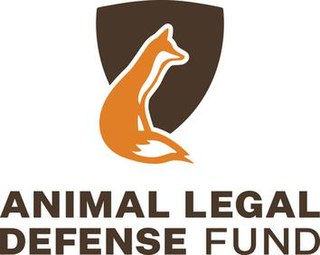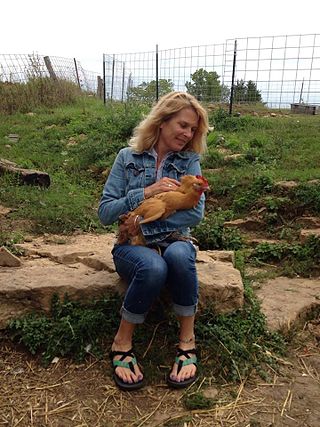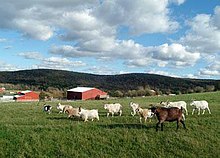
Foie gras ; French:[fwaɡʁɑ], ) is a specialty food product made of the liver of a duck or goose. According to French law, foie gras is defined as the liver of a duck or goose fattened by gavage.

Viva! is a British animal rights group, which focuses on promoting veganism. It was founded by Juliet Gellatley in 1994. Viva! carries out undercover investigations to expose the abuse of factory farmed animals and produces information on how to go vegan, including recipes and shopping guides. It is a registered charity.

The Animal Protection and Rescue League (APRL) is an American grassroots animal rights organization, founded in 2003, based in California's San Diego and Orange Counties.
Animal welfare and rights in Israel is about the treatment of and laws concerning nonhuman animals in Israel. Israel's major animal welfare law is the Animal Protection Law, passed in 1994, which has been amended several times since. Several other laws also related to the treatment of animals: Rabies Ordinance, 1934; Fishing Ordinance, 1937; Public Health Ordinance, 1940; Wildlife Protection Law, 1955; Plants Protection Law, 1956; Criminal Procedure Law, 1982; Animal Disease Ordinance, 1985; National Parks, Nature Reserves, National Sites and Memorial Sites Law, 1991; the Law of Veterinarians, 1991; Dog Regulation Law, 2002; Rabies Regulations (Vaccinations), 2005; and Prohibition on declawing cats unless for reasons vital to the cat's health or owner's health, 2011.
Animal Outlook, formerly known as Compassion Over Killing (COK), is a nonprofit animal advocacy organization based in Washington, D.C. It is headed since May 2021 by Executive Director Cheryl Leahy, who succeeded Erica Meier. Formed in 1995, as a high school club, their primary campaigns are to advocate against factory farming and promote vegan eating. While the group welcomes those who are interested in animal welfare who eat meat, it encourages a transition to a plant-based diet.
Peter Joseph Egan is a British actor and animal rights activist.

The Animal Legal Defense Fund is an American animal law advocacy organization. Its stated mission is to protect the lives and advance the interests of animals through the legal system. It accomplishes this by filing high-impact lawsuits to protect animals from harm, providing free legal assistance and training to prosecutors to assure that animal abusers are punished for their crimes, supporting tough animal protection legislation and fighting legislation harmful to animals, and providing resources and opportunities to law students and professionals to advance the emerging field of animal law. In addition to their national headquarters in Cotati, California, the Animal Legal Defense Fund maintains an office in Portland, Oregon.

Hillside Animal Sanctuary, based in Frettenham, Norwich, and with a site at West Runton, North Norfolk, is the United Kingdom's largest home for different kinds of farm animals and horses. The vegan-run sanctuary is funded entirely on public donations. The sanctuary was established by Wendy Valentine and its patron is actor Martin Shaw.

Gene Baur, formerly known as Gene Bauston, is an author and activist in the animal rights and food movement. He’s been called the "conscience of the food movement" by Time magazine, and opposes factory farming and advocates for what he believes would be a more just and respectful food system. Baur is president and co-founder of Farm Sanctuary, a farm animal protection organization. He is vegan and has been involved with animal rights since he co-founded Farm Sanctuary in 1986. Baur has authored two books and various articles.

The production of foie gras involves the controversial force-feeding of birds with more food than they would eat in the wild, and more than they would voluntarily eat domestically. The feed, usually corn boiled with fat, deposits large amounts of fat in the liver, thereby producing the fatty consistency sought by some gastronomes.

Liberation BC is a non-profit animal rights organization based in Vancouver, British Columbia, Canada, founded in 2004. It is run entirely by volunteers, including the board of directors, and has an e-mail network of nearly 4000 supporters. The stated mission of Liberation BC is "to expose animal exploitation through outreach and education, to promote a vegan lifestyle as the most effective and attainable way to protect animals, and to build and provide support for a strong community of effective animal advocates."

Karen Dawn is an American animal rights and welfare advocate and writer.
The California foie gras law or Senate Bill 1520 is a California State statute that prohibits the "force feed[ing of] a bird for the purpose of enlarging the bird's liver beyond normal size" as well as the sale of products that are a result of this process (§ 25982). This outlawed the traditional method of producing foie gras in California. The law was enacted in 2004 and went into effect on July 1, 2012. The law has been challenged repeatedly since its enactment. The ninth circuit in 2022 upheld a lower court’s 2020 ruling, which allowed residents to purchase foie gras for their individual use from out-of-state retailers.

D’Artagnan (D'Artagnan, Inc., also known as D'Artagnan Foods) is a food seller and manufacturer of beef, pork, lamb, veal, pâtés, sausages, smoked and cured charcuterie, all-natural and organic poultry, game, free-range meat, foie gras, wild mushrooms, and truffles.
Ryan Noah Shapiro is a doctoral student at the Massachusetts Institute of Technology Doctoral Program in History, Anthropology, Science, Technology, and Society (HASTS), a U.S. Freedom of Information Act (FOIA) researcher, and an advocate for animal rights.

Direct Action Everywhere (DxE) is an international grassroots network of animal rights activists founded in 2013 in the San Francisco Bay Area. DxE uses disruptive protests and non-violent direct action tactics, such as open rescue of animals from factory farms. Their intent is to build a movement that can eventually shift culture and change social and political institutions. DxE activists work to "put an end to the commodity status of animals."

Lorri Houston is a pioneer for the farm animal sanctuary movement. Houston has been an animal rights researcher, activist, and a vegan for most of her life. She co-founded the Farm Sanctuary in 1986 and founded Animal Acres in 2005. Houston has played a crucial role in the animal rights and activism movement over the past 20 years, and has made significant contributions to legislation and legal terminology regarding animal cruelty against farm animals subject to factory faming. Houston's work with animal rights is strongly tied to feminist theory because of its deep-rooted connections between the oppression of women and the oppression of animals in society.
Animal welfare and rights in France is about the treatment of and laws concerning non-human animals in France. France has moderate animal welfare protections by international standards.

Proposition 12 was a California ballot proposition in that state's general election on November 6, 2018. The measure was self-titled the Prevention of Cruelty to Farm Animals Act. The measure passed, by a vote of about 63% Yes to 37% No.













